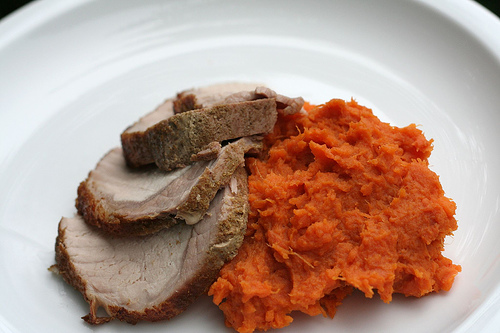Protein is a macro nutrient composed of amino acids that is necessary for the function of the human body and proper growth. While the body can manufacture several amino acids required for protein production, a set of essential amino acids needs to be obtained from animal and/or vegetable protein sources.
There is considerable debate over the amount of protein a person needs to consume per day, the current recommended daily intake (RDI) of protein is 46 grams for women aged 19-70 and 56 grams for men aged 19-70. Any excess protein consumed is turned into energy by the body, and it is controversial whether this excess protein causes a strain on the liver. A deficiency in protein leads to muscle atrophy, and impaired functioning of the human body in general.
#1Cheese Of all cheeses low sodium Parmesan cheese provides the most protein with 41.6 grams per 100 gram serving. It is followed by regular whole Parmesan at 35.8 grams of protein per 100 grams. That is 10 grams of protein per ounce, and 3.6 grams per cubic inch. Other cheeses like Romano, Mozzarella, and Swiss provide around 28-30 grams of protein per 100 gram serving. Softer cream cheeses, or spreadable cheeses, provide the least protein with only 16 grams per 100 gram serving.
#2 Mature (Large) Beans
The older, larger, and more mature a bean gets the more protein it carries. Mature roasted soybeans have the most providing 39.6 grams of protein per 100 gram serving, or 68 grams per cup. They are followed by mature Lupin beans which provide 15.6 grams per 100 gram serving. That is 25.8 grams per cup.
#3 Lean Veal and Beef
To get the most protein out of meat, it is best to choose lean cuts. Specifically the top round of veal or beef provides around 36 grams of protein per 100 gram serving, or 93 grams per pound (uncooked), and 31 grams in a 3 ounce serving.
#4 Roasted Pumpkin, Squash, and Watermelon Seeds
A popular food in the Middle East and East Asia pumpkin and squash seeds provide 33 grams of protein per 100g serving, that is 74.8 grams per cup and 9.2 grams per ounce. Watermelon seeds provide slightly less at 28 grams of protein per 100 gram serving. If you can't find these seeds in your local supermarket you will surely find them in Middle Eastern or East Asian specialty stores. Alternatively, you can also save any pumpkin, squash, and watermelon seeds you have and roast them in your oven. The seeds are typically consumed by cracking the outer shell and eating the seed inside.
#5 Lean Meats (Chicken, Lamb, Pork, Turkey)
Most lean meats provide around 30 grams of protein (30%) in a 100 gram serving. Chicken broilers have the most with 32.8 grams of protein per 100 gram serving, which is 46 grams per cup, and 27 grams in half a chicken breast. Pork loin and chops have 30 grams per 100 gram serving or 19.2 grams of protein per chop.
#6 Fish (Tuna, Anchovies, Salmon)

Fish are becoming more popular as knowledge spreads on the value of their fats and oils. As for protein Yellowfin Tuna provides the most with 30 grams per 100 gram serving, or about 8 grams per ounce. It is followed by Anchovies(29g), Salmon(27g), Halibut(27g), Snapper(26g), and Tilapia(26g).#7 Fish Eggs (Roe and Caviar)

Caviar and fish eggs are most often eaten as a garnish or spread. A sampling of fish roe (eggs) from a variety of species found they provide 28.6 grams of protein in a 100 gram serving. That is 8 grams of protein per ounce. Caviar will provide 24 grams of protein in a 100 gram serving or 6.9 grams per ounce. Chicken eggs, by comparison, only offer 13.6 grams of protein in a 100 gram serving, or 6.3 grams of protein per egg.#8 Yeast Extract Spread (aka: Marmite)
Yeast extract spreads are popular in Britain and Europe, and have started to gain popularity in the U.S. A good vegan source of vitamin B12, the spread also packs a lot of protein. One hundred grams provides 27.8 grams of protein, that is 1.7 grams per teaspoon.
#9 Lobster and Crab
Crab and lobster are most commonly served baked, steamed, or in bisque. A 100g serving of lobster contains 26.4 grams of protein, or 43 grams per lobster. Crab provides a little less with 19.4 grams per 100 gram serving.#10 Lentils, Pulses, and Peanuts
Lentils, pulses, and peanuts (a legume) are a great vegan source of protein. Peanuts provide the most protein with 23.7 grams per 100 gram serving or 6.6 grams per ounce, 0.2 grams per peanut. Lentils provide the most protein when consumed raw at 25.8 grams per 100 gram serving, and 9 grams per 100g serving cooked (17.9 grams of protein per cup).
Related Posts























0 comments:
Post a Comment